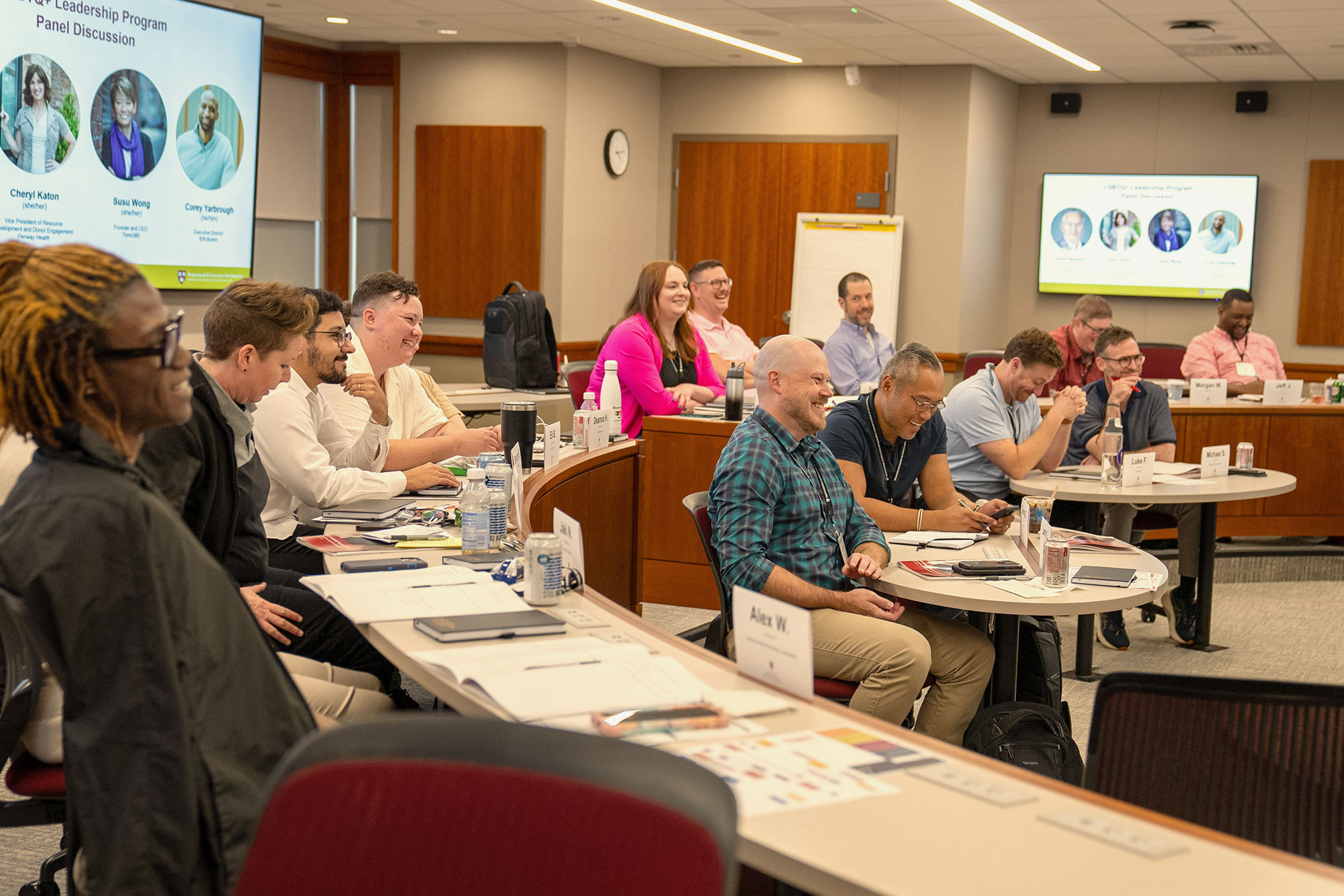On this page
The world of work is rapidly changing. The rise of artificial intelligence, automation, and other sophisticated technology is expected to eliminate many jobs, alter others, and create new fields.
To find new solutions to enduring problems, meet challenges, and create climates for innovation, companies need nimble leaders who think critically, inspire others, and nurture creativity — a skill set known as “durable” skills.
The Critical Need for Developing Durable Skills
Professionals who want to stay relevant in their fields will need these so-called “soft” or “durable” skills to open new ways of thinking, remain competitive, and create new possibilities.
Anne Manning and Susan Robertson teach Creative Thinking: Innovative Solutions to Complex Challenges at Harvard Division of Continuing Education Professional & Executive Development. The course focuses on the creative thinking skills needed to solve complex problems and design innovative solutions.
“The ground is always shifting; technology is always changing, and it changes ever faster. [But] I think the challenges people face are the same ones I faced as a young professional: you’re always trying to solve some kind of challenge,” says Manning. “Your tools and techniques may change, but how you think and approach that and how you harness other people’s energies around that, that’s the area where you need to have success.”
Robertson added, “Being able to adapt more nimbly when things change and you need new ideas and new solutions is a very important skill to have in the workplace. I think it is a foundation for success.”
Meet Our Experts


How Technology is Transforming the Job Market
According to the World Economic Forum Future of Jobs report for 2023, technology will transform businesses over the next decade, with the fastest-growing roles driven by technology, digitalization, and sustainability.
AI and machine learning specialists top the list of rapidly growing jobs, and the jobs on the fastest decline include administrative and clerical positions, as well as any that can be displaced by artificial intelligence.
As a result, “analytical thinking and creative thinking remain the most important skills for workers,” according to the report.
Why Lifelong Learning Matters
According to a 2024 LinkedIn report, most employees say improving their skills is a top priority, and would spend more time on their own development if learning was personalized for their interests and goals.
All professionals, as busy as they may be, should prioritize lifelong learning as the means to ensure a viable future, says Robertson.
“Learning skills is important, but it never feels like the most urgent thing on your plate,” she says. “In a year, you will be sorry if you didn’t make it urgent. There’s all kinds of ways to learn the skills, it’s the prioritizing of it that is hard.”
Harvard’s Professional & Executive Development program offers continued support for professionals throughout their lifelong learning journeys. Whether you’re seeking to upskill communication, leadership, or artificial intelligence training, there are dozens of courses to keep you learning and growing.
Job Skills Employers are Seeking in 2024 and Beyond
Skills in AI and big data will only grow in importance over the coming years, but Robertson highlights that the World Economic Forum still found employers rank analytical and creative thinking as the highest priority job skills they want on a job application or resume.
The WEF interviews leaders of corporations, CEOs, and human resource professionals to provide information about the current state of industries.
“They were higher than all the other things you might expect to see on a report like that — higher than AI, higher than resilience, higher than tech skills,” Robertson said.
Why is this? The increasing importance of complex problem-solving in the workplace.
“How do you generate solutions that become so broad you really get someplace that has the potential for newness?” Manning asks. “To get beyond what you already know, what’s been tossed around, you really have to spend time opening your mind to a wide range of possibilities, even if some seem crazy.”
She advises that professionals and businesses should create the space for uncertainty and ideation to explore new ideas and solutions.
According to the WEF report, the top 10 skills on the rise are:
- Analytical thinking
- Creative thinking
- Resilience flexibility and agility
- Motivation and self-awareness
- Curiosity and lifelong learning
- Technological literacy
- AI and big data
- Talent management
- Service orientation and customer service
- Systems thinking
Similarly, a February 2024 LinkedIn survey found that global leaders agree that the so-called “soft” or “durable” skills are only growing in importance.
The survey listed the following skills as most in-demand:
- Communication
- Customer service
- Leadership
- Project management
- Management
- Analytics
- Teamwork
- Sales
- Problem-solving
- Research
It comes down to this: whether managing people or data, companies need employees with problem-solving skills to pull people and technology together.
How “soft” skills work in collaboration with technology
While AI and technology can do a lot, it can’t do everything. There are still business tasks that require human skills.
Communication and collaborative skills that help employees spot opportunities, develop solutions, manage change, and respond to ethical implications will help professionals stay agile in this new world of work, according to a February 2023 Forbes article.
Ultimately, technology is still used by human beings and does not operate completely autonomously. Human intuition, relationships, and decision making are crucial.
“Humans aren’t rational; they don’t think like machines,” says Robertson. “The ability to have empathy is important. Feelings will impact the outcome, and if you ignore them, it will be to the detriment of the solution.”
Learning skills is important, but it never feels like the most urgent thing on your plate,” she says. “In a year, you will be sorry if you didn’t make it urgent.
Susan Robertson
Invest in Developing Soft and Durable Skills
Companies surveyed in the WEF report indicated that investing in learning is one of the most common workforce strategies to deliver organizations’ business goals.
Professional development is the key to expanding on existing experience through reskilling or upskilling. Whether changing careers, finding a new job, or seeking promotion in a current field, all professionals should be focused on lifelong learning.
Beyond achieving expertise in their chosen industry, those pursuing a move to the C-suite need to focus on developing leadership abilities by expanding their emotional intelligence, communication, and critical thinking skills to enhance decision-making and people management.
“A learner mindset is absolutely critical. People with fixed mindsets are going to struggle,” Robertson says.
Durable skills like active listening, conflict resolution, collaboration, and creativity are necessary for future success in every industry, no matter what education level professionals acquire.
A focus on these skills could lead to improved workplaces where human connection and shared values are encouraged.
Finding the right leadership program will help you identify your professional goals and the skills you need to hone to achieve career success. Harvard’s Professional & Executive Development offers dozens of courses taught by exceptional instructors designed to prepare you for the workplace changes and challenges ahead.

